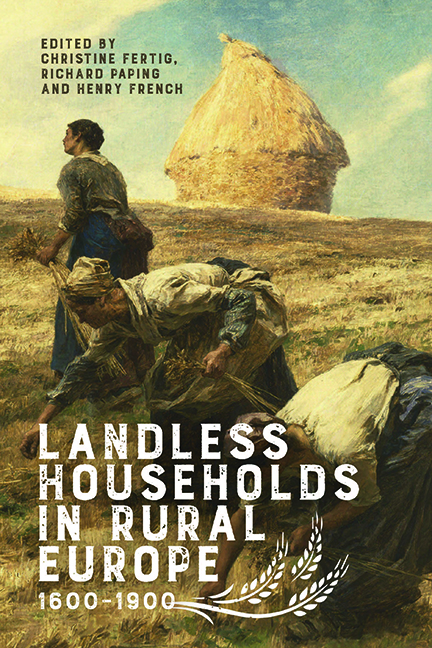Book contents
- Frontmatter
- Contents
- List of Illustrations
- Notes on Contributors
- Preface
- Introduction
- 1 The Treballadors of Girona: Evidence of the Emergence of Wage Labour in Early Modern Catalonia in the Sixteenth and Seventeenth Centuries
- 2 The Squatter Economy of the English Countryside: Building New Landless Communities in England, c. 1600–1900
- 3 The Rise of Landless Households in the Dutch Countryside, c. 1600–1900
- 4 ‘Gaining Ground’ in Flanders after the 1840s: Access to Land and the Coping Mechanisms of Landless and Semi-Landless Households, c. 1850–1900
- 5 Strategies of Survival, Landlessness and Forest Settlement in Flanders: The Forest of Houthulst in a Changing Landscape of Survival (c. 1500–1900)
- 6 Landless and Pauper Households in England, c. 1760–1835: A Comparison of Two Southern English Rural Communities
- 7 Landless Rural Households in France, 1852–1910
- 8 Survival in a Hostile Agrarian Regime: Landless and Semi-Landless Households in Seventeenth-Century Sweden and Finland
- 9 Farming Craftsmen? Access to Land and the Socio-Economic Position of Rural Artisans in Early Modern Finland
- 10 Landlessness and Marriage Restrictions: Tyrol and Vorarlberg in the Eighteenth and Nineteenth Centuries
- 11 Cottages, Barns and Bake Houses: Landless Rural Households in North-Western Germany in the Eighteenth Century
- Bibliography
- Index
- Boydell Studies in Rural History
6 - Landless and Pauper Households in England, c. 1760–1835: A Comparison of Two Southern English Rural Communities
Published online by Cambridge University Press: 08 October 2022
- Frontmatter
- Contents
- List of Illustrations
- Notes on Contributors
- Preface
- Introduction
- 1 The Treballadors of Girona: Evidence of the Emergence of Wage Labour in Early Modern Catalonia in the Sixteenth and Seventeenth Centuries
- 2 The Squatter Economy of the English Countryside: Building New Landless Communities in England, c. 1600–1900
- 3 The Rise of Landless Households in the Dutch Countryside, c. 1600–1900
- 4 ‘Gaining Ground’ in Flanders after the 1840s: Access to Land and the Coping Mechanisms of Landless and Semi-Landless Households, c. 1850–1900
- 5 Strategies of Survival, Landlessness and Forest Settlement in Flanders: The Forest of Houthulst in a Changing Landscape of Survival (c. 1500–1900)
- 6 Landless and Pauper Households in England, c. 1760–1835: A Comparison of Two Southern English Rural Communities
- 7 Landless Rural Households in France, 1852–1910
- 8 Survival in a Hostile Agrarian Regime: Landless and Semi-Landless Households in Seventeenth-Century Sweden and Finland
- 9 Farming Craftsmen? Access to Land and the Socio-Economic Position of Rural Artisans in Early Modern Finland
- 10 Landlessness and Marriage Restrictions: Tyrol and Vorarlberg in the Eighteenth and Nineteenth Centuries
- 11 Cottages, Barns and Bake Houses: Landless Rural Households in North-Western Germany in the Eighteenth Century
- Bibliography
- Index
- Boydell Studies in Rural History
Summary
Despite the huge volume of research on relief practices, experiences of poverty, provision for the elderly and the adequacy (or otherwise) of waged labour, English historiography has paid relatively little attention to the relationship between the landlessness of the rural workforce and rural poverty. Two of the most notable conceptual considerations of this relationship, by Catharina Lis and Hugo Soly and Larry Patriquin, adopt a Marxist perspective. Both have suggested that the universal system of English parochial relief facilitated (as well as compensated) the growth of the landless agrarian population in seventeenth- and eighteenth-century England. As Patriquin put it: ‘Poor relief was a substitute for access to land and common rights, a virtual exchange of money as compensation for the creation of absolute private property, brought about by competition, enclosure and engrossment.’ In addition, there has been some debate about the frequency and effects of labourers’ access to common land. Jane Humphries demonstrated the financial value of access to common land in the late eighteenth century by showing that the annual income from a cow ‘was often more than half the adult male laborer's wage’. Craig Muldrew found that 44 per cent of his sample of (relatively prosperous) labourers’ probate inventories included cattle in the eighteenth century, but few listed leaseholds of land. However, in eighteenth-century Buckinghamshire and Northamptonshire Leigh Shaw-Taylor found that only ‘around one labourer in ten had access to land’, even before common lands were enclosed. Other studies found no statistical link between enclosure and increases in per capita relief levels, which implied that labourers had no land to lose.
Alongside evidence of the pervasive landlessness of English agricultural labourers in the eighteenth century, detailed research by Mark Blaug, Daniel Baugh, Richard Smith, Thomas Sokoll, Steven King and Samantha Williams has highlighted how the cost of poor relief increased from the early 1780s and accelerated rapidly after 1794. Poor harvests in the late 1790s were compounded by wartime trade blockades and price inflation. Although prices eased after 1813, the subsequent period of deep recession in the arable economy caused severe unemployment among rural labourers in Southern England until at least 1825.
- Type
- Chapter
- Information
- Landless Households in Rural Europe, 1600-1900 , pp. 139 - 169Publisher: Boydell & BrewerPrint publication year: 2022

